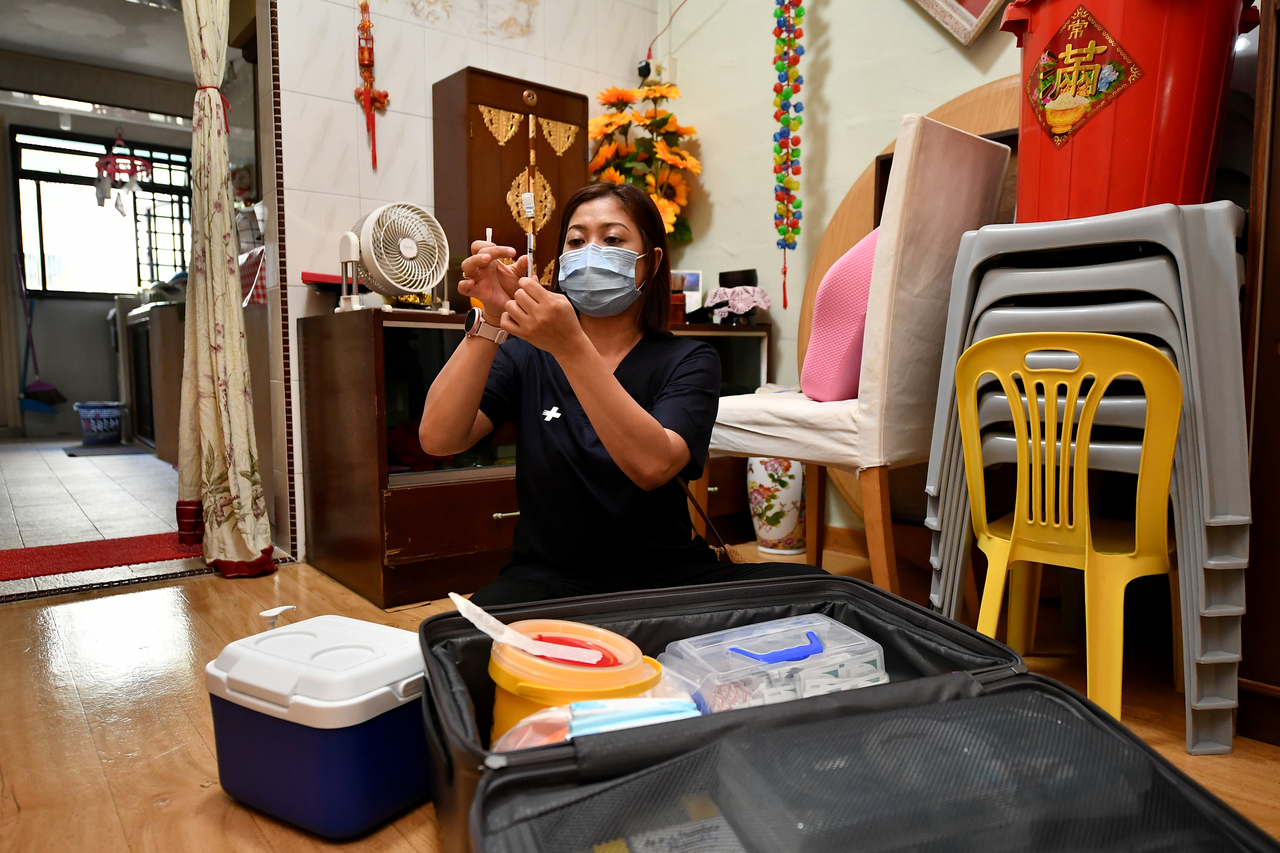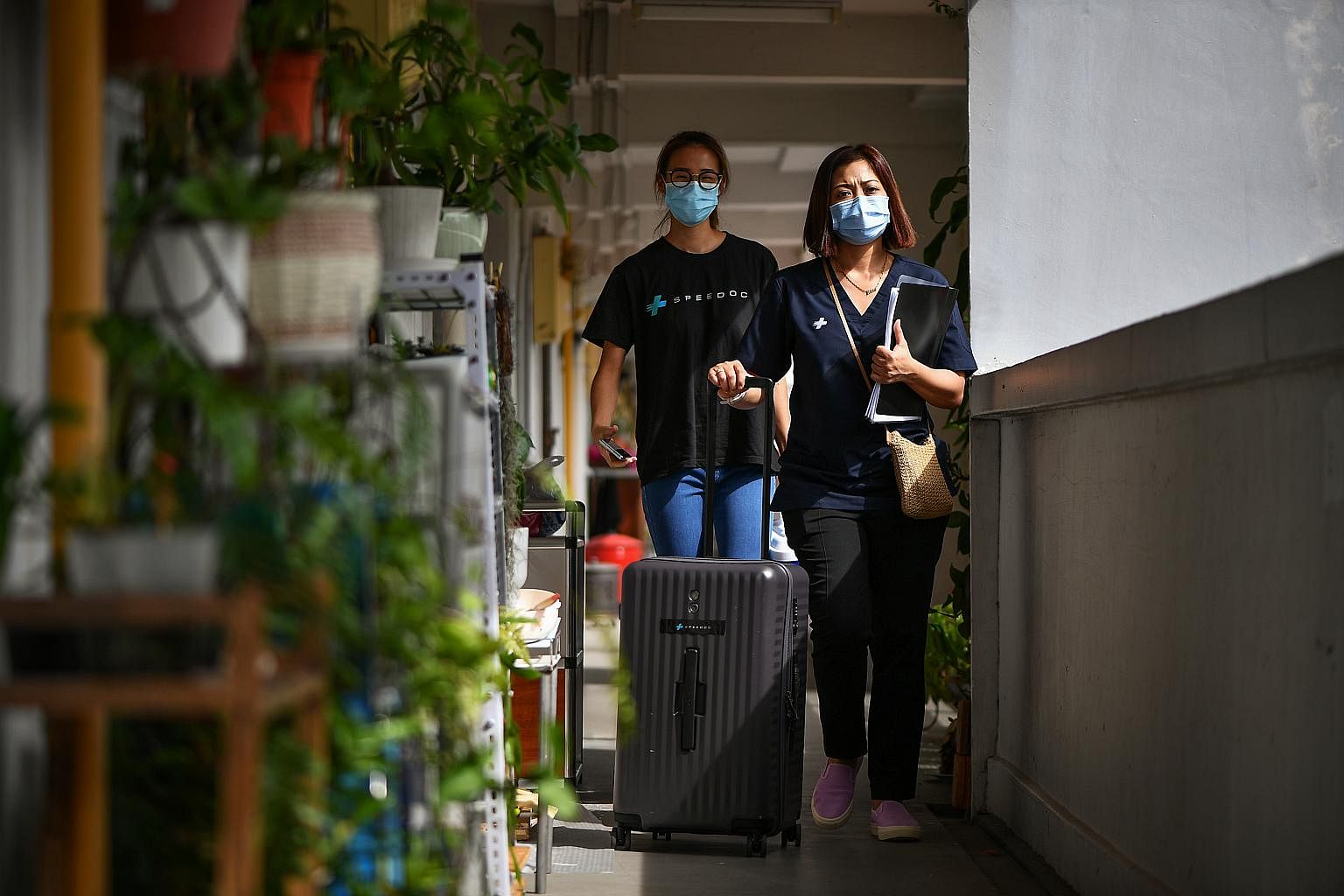Home vaccination teams ramping up efforts despite challenges
Sign up now: Get ST's newsletters delivered to your inbox

Nurse Masturina Mohamed Ariff, attached to home care provider Speedoc, preparing to vaccinate Ms Ang Kim Kee and her helper Lae Lae Win at their home on Aug 16, 2021.
ST PHOTO: LIM YAOHUI
SINGAPORE - Nurse Masturina Mohamed Ariff, 37, last month visited a flat where a middle-aged woman with dementia refused to be vaccinated. She was roaming the flat without diapers and pants on.
The woman's husband had to coax her with ice cream. Once she calmed down, Ms Masturina, who is attached to home care provider Speedoc, quickly jabbed her with the Covid-19 vaccine.
Vaccination nurses have also had close shaves with needle stick injuries while trying to vaccinate patients with aggressive traits, said a medical practitioner closely involved with the programme.
Once, a caregiver did not allow a team into the house, fearing that the medical staff might be contaminated or "dirty". The team comprising a doctor and nurse had to vaccinate the patient from outside the gate, added the practitioner.
Ms Masturina and others like her have contributed to Singapore's vaccination figures reaching among the highest in the world.
Eighty per cent of the population are fully vaccinated. The focus is now on the home teams and mobile vaccination teams in the heartland.
As at Sunday (Aug 29), more than 4,300 housebound individuals have received their shots, said Health Minister Ong Ye Kung in a Facebook post.
Each week, the authorities have been receiving about 700 requests for home vaccinations, added Mr Ong, highlighting the high demand for the service.
To date, more than 200 healthcare workers have responded to Mr Ong's Aug 6 Facebook call for doctors and nurses to help with the efforts. About 40 of them will be progressively deployed, the Ministry of Health (MOH) told The Straits Times.
The Singapore Armed Forces, as well as Pancare Medical Clinic, SATA Commhealth and Healthway Medical Group will be setting up home vaccination teams, on top of three existing home vaccination providers.
As a result, the number of home vaccination teams will triple from 11 to 33 by Sept 6, added MOH.
On Aug 6, when there were just 11 teams, the waiting time for the housebound was eight weeks. But with more teams, the waiting time can be halved to a month, he added.
The nation aims to complete all home vaccinations by the end of next month.
Meanwhile, the number of vaccination centres will be progressively reduced, Mr Ong had said on Aug 19.
Those eligible to receive their shots at home include bedbound seniors, people with disabilities, those with autism, and those who are unable to sit for 30 minutes owing to health or behavioural conditions.
Dr Yan Shi Yuan, director of Edgedale Medical Clinic, which runs six home vaccination teams, said each team visits between eight and 12 homes a day, and vaccinates between seven and 17 people. They work between 10 and 12 hours each day.
Speedoc's assistant nurse manager Nurul Amirah Junaidi, 31, said they have to rush between homes.
One constraint is the six-hour lifespan of the diluted vaccines.
Teams have to eat their lunch on the go, and work through heavy rain and long traffic jams, which can throw off their schedule.
Some teams are also tasked with vaccinating nursing home residents, which involves donning personal protective equipment and taking antigen rapid tests. Dr Yan said his team spent two hours vaccinating seven nursing home residents.

Dr Fiona Ng (left) and nurse Masturina Mohamed Ariff heading to an apartment to vaccinate a homebound senior, on Aug 16, 2021.
ST PHOTO: LIM YAOHUI
From Monday (Aug 30), Speedoc - which has been running five teams - will be deploying three more teams, and Edgedale two more teams. The third existing home care service, Jaga-Me, will have five teams this week, up from three.
Dr Fiona Ng, a locum doctor with Speedoc, said compassion is the key to winning over patients who are agitated, or anxious about the vaccination.
"If the patient has dementia or is known to be agitated, a family member will switch on the TV to distract her, another family member will be feeding her Yakult, and I'll be holding her hand, and the nurse will give the jab," said the 29-year-old.


